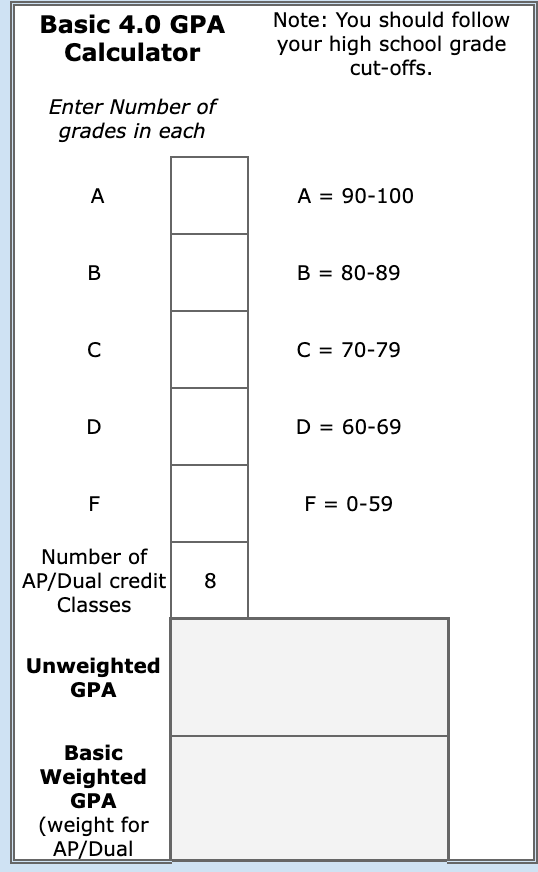As the parent of a high school junior or senior, you might be well aware of the importance of grade point average (GPA) in the college admissions process. GPA is a critical factor that colleges use to assess a student's academic performance and potential for success in higher education. Understanding how GPA is calculated, how it varies from school to school, and how college admissions offices may recalculate it can help you and your child navigate the college admissions process more effectively. This blog post will provide an overview of these aspects and emphasize the importance of focusing on GPA from the beginning of the school year.
How GPA is Calculated
GPA is a numerical representation of a student's average performance across all their courses. It is typically calculated on a 4.0 scale, with the following general breakdown:
A (90-100%) = 4.0
B (80-89%) = 3.0
C (70-79%) = 2.0
D (60-69%) = 1.0
F (below 60%) = 0.0
Each grade is converted to its numerical equivalent to calculate GPA, and the average is taken. For example, if a student has the following grades:
Math: A (4.0)
Science: B (3.0)
English: A (4.0)
History: B (3.0)
The GPA would be calculated as: (4.0 + 3.0 + 4.0 + 3.0) / 4 = 3.5
Variations in GPA Calculation
It's important to note that GPA calculation can vary from school to school. Some schools use weighted GPAs, which give extra points for more challenging courses like Advanced Placement (AP) or honors classes. For example:
A in an AP class: 5.0
B in an AP class: 4.0
C in an AP class: 3.0
Other schools may use an unweighted GPA, where all classes are graded on the same scale regardless of difficulty. Additionally, some schools use a different scale, such as a 5.0 or 6.0 scale, which can further complicate comparisons.

How College Admissions Offices Recalculate GPA
Many college admissions offices recalculate GPAs based on their criteria to create a level playing field. This process ensures that students from different high schools are evaluated on a comparable scale. Here's how colleges might approach recalculating GPA:
Core Courses Only: Some colleges focus on grades from core academic subjects (Math, Science, English, Social Studies, and Foreign Languages) and may exclude electives or non-academic courses.
Unweighted GPA: Colleges may convert weighted GPAs to an unweighted 4.0 scale to standardize comparisons.
Consistent Weighting: Colleges might apply their weighting system to honors, AP, or IB courses to ensure application consistency.
Grade Trends: Admissions officers also look at grade trends over time, considering whether a student's performance has improved, declined, or remained steady throughout high school.
The Importance of Focusing on GPA from the Beginning of the School Year
Starting the school year with a focus on GPA is crucial for several reasons:
Early Foundation: The grades earned at the beginning of the year set the foundation for the overall GPA. A strong start can provide a buffer in case of challenges later in the year.
Consistency: Maintaining a consistent high performance level throughout the year is often viewed more favorably than fluctuating grades. It demonstrates a student's ability to manage their workload and maintain their commitment to their studies.
Improvement Opportunities: This year is crucial for juniors as it is the last full year of grades colleges will see before applications are submitted. Any improvement in GPA can significantly impact college admissions decisions.
Scholarships and Honors: Many scholarships and honors programs have GPA requirements. A higher GPA can increase eligibility for financial aid and academic recognition.
Stress Management: Procrastination and last-minute efforts can lead to unnecessary stress and lower grades. Establishing good study habits and time management can alleviate pressure and improve academic outcomes.
Tips for Supporting Your Child's GPA
Encourage Time Management: Help your child create a study schedule that allows for regular review and prevents last-minute cramming.
Communicate with Teachers: Encourage your child to communicate with their teachers about any challenges they're facing. Seeking help early can prevent minor issues from becoming more significant problems.
Utilize Resources: To support your child's learning, use available resources such as tutoring, study groups, and online educational tools.
Set Realistic Goals: Help your child set achievable academic goals and celebrate their progress along the way.
Conclusion
GPA is a critical component of the college admissions process, and understanding its importance can help you guide your child toward academic success. By focusing on GPA from the beginning of the school year, maintaining consistent effort, and utilizing available resources, your child can achieve a strong academic record that enhances college applications. Remember, while GPA is important, it's also essential to consider your child's overall well-being and balance. With the proper support and strategies, your child can navigate the demands of high school and emerge prepared for the challenges of college.
As always, I look forward to your conversations with your students, teens, and young adults. Let's make this journey joyful and transformative for them!
If you liked this post, I would be grateful if you clicked one of the socials below and shared it to help more parents guide their students to their thriving educational path!
Need help coming up with a college application game plan?
Schedule a free 30-minute call, and I will help you set up one! There are no strings attached! Click the link here.

Digital Analytical Balance Price - 0.1mg Electronic Weighting